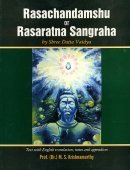Rasabandhana, Rasa-bandhana: 6 definitions
Introduction:
Rasabandhana means something in Hinduism, Sanskrit. If you want to know the exact meaning, history, etymology or English translation of this term then check out the descriptions on this page. Add your comment or reference to a book if you want to contribute to this summary article.
In Hinduism
Ayurveda (science of life)
Rasashastra (Alchemy and Herbo-Mineral preparations)
Source: Wisdom Library: Rasa-śāstraRasabandhana is a Sanskrit term. Rasa means “mercury” and Bandhana means “binding” or “solid”. This term refers to the alchemical process of solidifying mercury, as per rasaśāstra (medicinal alchemy).
Source: Google Books: Iatro-chemistry of Āyurveda, RasaśāstraRasabandhana (रसबन्धन):—Mercury solidified and made non-volatile by the addition of conch-shell, śukti (sea-shell), varāṭikā (cowrie-shell), etc., and with kṣāra (alkali preparations) promotes lustre and nourishment and reduces obesity. (according to the Rasadarpaṇa)
Unclassified Ayurveda definitions
Source: archive.org: Science And Technology In Medievel India (Ayurveda)Rasabandhana (रसबन्धन) refers to one of the topics dealt with in the Vaidyakalpataru, as mentioned in A. Rahman’s Science and Technology in Medievel India: A bibliography of source materials in Sanskrit, Arabic and Persian.—Ancient and medieval India produced a wide range of scientific manuscripts [e.g., the Vaidyakalpatarua] and major contributions lie in the field of medicine, astronomy and mathematics, besides covering encyclopedic glossaries and technical dictionaries.—The Vaidyakalpataru is a medical treatise in Sanskrit in twenty-one chapters [e.g, Rasabandhana] dealing with the preparation of medicines from compounds of mercury, sulphur, gold and other metals and on the treatment of specific diseases with the aid of these medicines
Rasabandhana (रसबन्धन) or Rasabandhanauṣadhya also refers to one of the various medicinal preparations described in the Vaidyakalpa.

Āyurveda (आयुर्वेद, ayurveda) is a branch of Indian science dealing with medicine, herbalism, taxology, anatomy, surgery, alchemy and related topics. Traditional practice of Āyurveda in ancient India dates back to at least the first millenium BC. Literature is commonly written in Sanskrit using various poetic metres.
Languages of India and abroad
Sanskrit dictionary
Source: Cologne Digital Sanskrit Dictionaries: Monier-Williams Sanskrit-English DictionaryRasabandhana (रसबन्धन):—[=rasa-bandhana] [from rasa > ras] n. ([probably]) a [particular] pan of the intestines, [Rāmāyaṇa]
[Sanskrit to German]
Sanskrit, also spelled संस्कृतम् (saṃskṛtam), is an ancient language of India commonly seen as the grandmother of the Indo-European language family (even English!). Closely allied with Prakrit and Pali, Sanskrit is more exhaustive in both grammar and terms and has the most extensive collection of literature in the world, greatly surpassing its sister-languages Greek and Latin.
See also (Relevant definitions)
Partial matches: Bandhana, Rasa.
Starts with: Rasabandhanaushadhya.
Full-text: Raktagandhaka, Divyaushadhi, Vaikranta.
Relevant text
No search results for Rasabandhana, Rasa-bandhana; (plurals include: Rasabandhanas, bandhanas) in any book or story.
Related products
